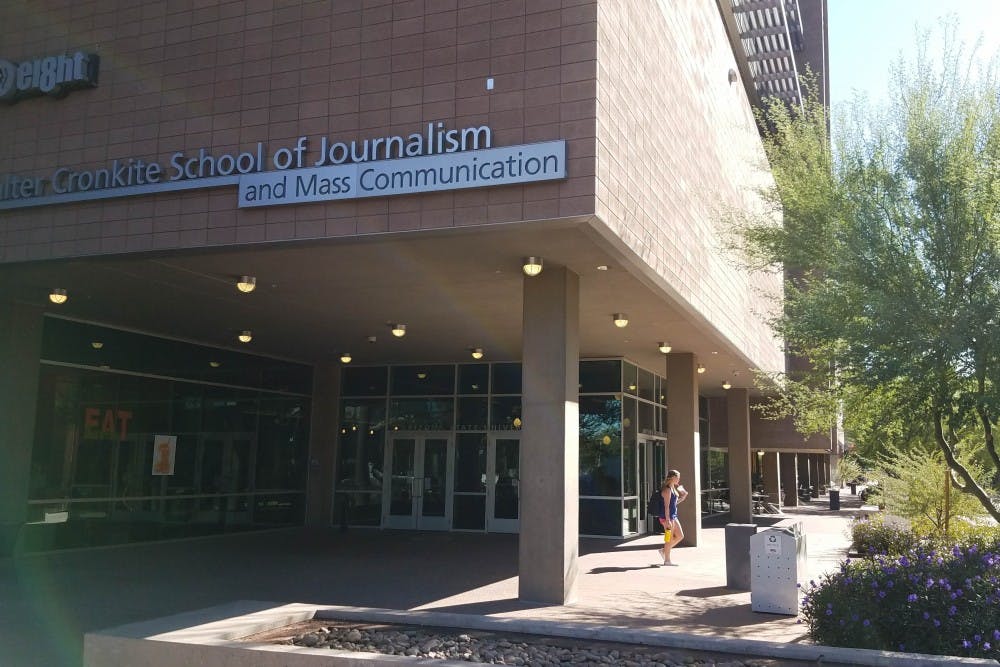David Marino is a senior at The Walter Cronkite School of Journalism and Mass Communication.
A cloud of controversy has founds its way around the Cronkite School, its reach fairly small, but symbolic implications far wider.
Despite recent criticism from several current and former students, the Cronkite School has announced it will continue to allow Sinclair Broadcast Group, owner of nearly 200 local TV stations across the country, to recruit at ASU. In an statement, Cronkite school Dean Christopher Callahan justified the decision by stating that in a hyper-competitive field like journalism, it is best not to limit employment opportunities for students.
Many critics of inviting Sinclair to campus pointed to several issues with the station, including its purported right-wing bias and business practices many see as hurting journalists. Arguably the most controversial recent event has been Sinclair requiring its news anchors to record a promo decrying members of the media pushing “biased and false news” for their own ideological ends.
I don’t believe the Cronkite School is coming from a bad place on this or even necessarily defending Sinclair’s actions in any regard; the school even joined several other journalism schools in a letter of protesting, condemning Sinclair for making the anchors read the statement on air, although it unsuccessfully attempted a dialogue with Sinclair before deciding to do so.
However, by allowing Sinclair to recruit on campus, although the school is not explicitly approving the network's practices, it is definitely not strongly condemning the recent action. Recruiting is a privilege, not a right. And in my opinion, that right is earned through the conduct of the news organization applying.
I don't see Sinclair’s most egregious action being that they have political bias in many of these segments; there is no problem with having bias if it is clearly labeled as commentary (as is, importantly, the designation for most of Sinclair’s especially right-wing content).
However, something I find highly offensive as journalist, and I believe goes against pretty much everything I have been taught in my four years in Cronkite, is that Sinclair has been repeatedly caught favoring certain political candidates in races without disclosing its own biases in doing so.
For example, Sinclair executives instructed reporters at their Baltimore affiliate to uncover unflattering information on Democratic candidate Kathleen Kennedy Townsend for 2002 Maryland gubernatorial election, using what former Sinclair reporter Jon Leiberman described as “all of our resources” to do so.
Or two years later, in 2004, when only a backlash prevented several of their stations from airing a feature-length film attacking 2004 Democratic presidential candidate John Kerry.
Or securing a deal that White House Senior Advisor Jared Kushner described as allowing Sinclair stations more access to Trump and his campaign in return for open air time without commentary on every Sinclair station, essentially promising de facto unchallenging coverage in return for access.
Andy Kroll is a reporter for Mother Jones, where he has reported on controversial practices by Sinclair. He describes the September 11th Attacks as a catalyzing event for the company in their shift to more ideologically driven news.
“If you look at the body of evidence all of the details that we have about the internal culture at Sinclair definitely points to a conservative culture there, and one that skews to the right,” Kroll said.
Kroll specifically pointed to a deposition filed in a lawsuit against Sinclair where a producer says that he was, among other things, told to buy three books during his first week of employment at the the station, two of which were by pundits known to leave conservative: Bernard Goldberg and Ann Coulter, as well as being recommended to read conservative websites by an executive.
Although some have accused Sinclair of offering positive coverage for Trump during the campaign, Kroll says that he believes that Sinclair instead offered “open air time,” which he says is even more valuable, especially given that there are so many Sinclair stations in battleground states.
“Sinclair is the largest local television company in America, which means it has this huge mega, this huge platform to put out programming, to put out a particular if it so chooses,” Kroll said. “What I think Sinclair did was say ‘we will use our platform to broadcast your message ... and you can have this airtime to tell us what your view for the country is, what you would do, and why are a better choice for president than Hillary Clinton.’"
Ethical journalists, including Kroll himself, disagree that Sinclair should be prevented from recruiting on campus, with many saying that by doing so, you prevent journalism students from making their own career choices.
I want my fellow journalism students to be able to make their own career choices, entering the one that suits them the best and allows them the best livelihood. However, they don't need to do that on Cronkite's campus; if they want to work for a Sinclair station, they can certainly take that initiative.
But there should be a higher standard for the kind of organizations that are allowed to recruit here at Cronkite. If any Cronkite student participated in some of the behavior Sinclair has done, the student would be condemned, if not potentially expelled.
Employment is important, but ethics is the lifeblood of journalism as a field. Cronkite should hold its students' potential employers to as high a standard as its students themselves.
Reach the blogger at Marinodavidjr@gmail.com or follow @Marinodavidjr on Twitter.
Editor’s note: The opinions presented in this blog are the author’s and do not imply any endorsement from The State Press or its editors.
Like The State Press on Facebook and follow @statepress on Twitter




